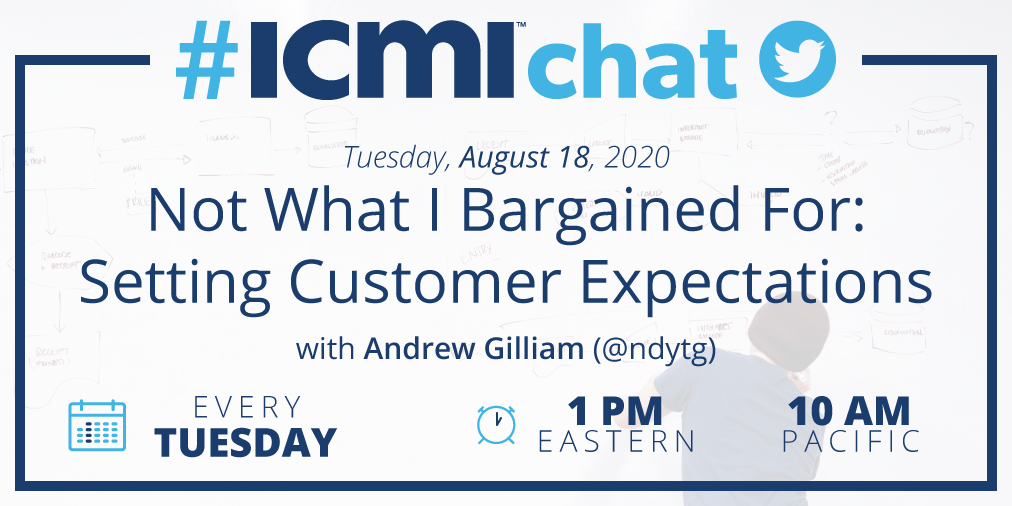By
The Editors
|
Date Published: August 12, 2020 - Last Updated September 09, 2020
|
Comments

Developing employees is one of a leader's most noble and crucial tasks. To achieve the outcomes we desire for our team, everyone occasionally needs a little feedback, direction, and encouragement. Coaching is the process by which managers help their employees be all they can be, and keep them focused on results the team needs to be successful.
Join us on Tuesdays at 1 p.m. Eastern, 10 a.m. Pacific to weigh in on the contact center industry's most pressing challenges. Next week, we explore "Not What I Bargained For: Setting Customer Expectations." A question preview follows this article.
Coaching isn't always well received; there's an art to it. Contact center coaches must be tactful and considerate when providing feedback to help employees feel valued and open-minded. Jeremy Watkin guest-hosted this week's ICMIchat to gather our best thoughts on approaching coaching in the contact center.
Coaching Defined
We officially define coaching as "Feedback, guidance, and reinforcement provided through ongoing interactions (formal or informal) between an
individual and the coach (usually their supervisor or manager)." Coaching is more than correcting employees for things they've done wrong; it's imperative that coaches identify and work with an agent's strengths and motivations. Through effective coaching, we can help our employees become more of what they already aspire to be.
My daughters had this AMAZING gymnastics coach. She was super positive and reinforced that each kid was doing well, but would give real-time feedback on how to continue improving. She did it in a way that felt "normal" & positive. She seemed invested in their success. Observing her was such a breathtaking reminder for me. That is what we should be - out there giving high fives and smiles, calling out what we see good and calling out what can be improved. All with he hope that folks will be successful.
Coaching is the interaction centered around improvement between manager & agent. We coach when we collaboratively review the call/chat, without bias, ask questions to allow the employee to connect behavior & outcome, and determine what to do differently next time.
Time and Place
Coaching is about personalized communication between the coach and an agent. In addition to personalizing the content of a coaching session, the time and manner in which coaching is delivered should also be personalized. Feedback provided in a coaching session could be undermined if the coachee feels disrespected or harshly criticized; that's not the goal. The environment where coaching takes place can influence how these essential discussions are received.
I’d say a healthy mix of both. Formal coaching helps address large gaps and reduce them to a more manageable quantum. Real-time individual coaching helps refine each individual after that. Thumb rule: praise publicly, criticise privately.
There needs to be both forms of coaching. Each employee is motivated and learn in different ways. Some employees like the structure of a formal coaching while others might feel slighted in that environment. While other like the informal one on one interactions.
Structuring the Dialogue
While some coaching occurs in real-time while agents are going about their work, it's also wise to dedicate time to one-on-one discussions without any distractions. Like all meetings, coaching meetings should have a purpose and a plan. If coaches don't know what they want to accomplish in a coaching session, agents won't know their expectations. Flexibility is encouraged, but having a clear agenda to guide the discussion and create consistency from one session to the next will make coaching more efficient for everyone.
Coaching behaviors & expectations should be recurring communications to the agents as part of the performance appraisal. The coaching discussions may include peer reviews about the handling of a customer transaction, review of a customer call or transaction, etc.
Identify current state, acknowledge previous growth & current successes, identify growth need, what's needed for success and what may block success, how success can be measured, and a timeline. Make it a conversation and not a lecture.
Monitoring Metrics
Metrics are an essential part of performance management, but there are different approaches to how they relate to coaching sessions. When metrics are emphasized, rather than behaviors, employees may feel pressured to do whatever it takes to meet a target at any cost. This often leads to unintended behavior, such as rushing customers off the phone or providing incomplete answers to meet goals for Average Handle Time. Some coaches prefer to focus on actions that create the desired outcomes without focusing on metrics during coaching sessions.
A few performance metrics to include in the discussions are:
-First call/contact resolution results (ways to improve, if applicable)
-Accuracy of information provided
-Problem identification upon initial contact
-Courtesy and clarity of agent during the call
Coaching is focused on skills. Our role is to connect the agent's behavior to the metric we want to improve. When we focus on the behavior, the result follows. When we focus on the outcome (KPIs), the team member will come up with their own behaviors. Which often times means cutting corners or an inconsistent experience for our customers. In my opinion, performance metrics need to be reviewed during monthly, formal 1:1s, but should not be part of the coaching conversation.
Measuring Success
Like all initiatives, we must approach coaching with specific, measurable goals in mind. Otherwise, we'll never know if our time coaching is well spent. On an individual level, coaches can ask for small improvements to follow up on in the next coaching session. Leadership must agree about how coaching success will be measured and then hold coaches accountable for meeting those goals at the team level.
I let them leave the room only with 1 action item for improvement in the same month, 2-3 more for the next quarter. I meet them again after that first month and course-correct. It works better for everyone to do this in manageable chunks.
I help the agent uncover ONE skill they can work on between the end of the current, and the beginning of our next coaching session. I may listen-in on a call remotely, but at the beginning of the next session, I always check in with the agent to see how it went.
Leadership must define the KPIs, data collections, and expectations to appropriately track the success of the coaching sessions for evidence-based conversations (formal process). Informal or spot coaching will also identify trends and follow-up for formal input
Making a Good Coach
Coaching requires business acumen, operations savvy, and the strongest interpersonal skills. Coaches must help agents understand their impact on the organization, keenly monitor performance, offer just-in-time recommendations, and deliver feedback with the utmost respect and empathy. Like all other skills, successful contact center coaching requires training, practice, and mentorship to master.
Great contact center coaches have done the job before and are empathetic to how tough the job can be. They are focused on personal improvement vs. quality scores. When the coaching is over the agent should feel like, "I can do better!" not "I just got dinged!"
Caring for the agent rather than "taking care" of the agent. Taking care is providing a positive work environment with all the tools at a competitive pay rate. Caring for them is helping them grow to achieve their personal goals.
Someone who can be concise, clear, caring. Someone who understand the expectations. Listens more than talks. Willing to have difficult conversations. Humble. "These are a few of my favorite thing"
Coaching the Coaches
Great coaches are all about helping other people work better. Likewise, they're also determined to coach better, themselves. The best coaches are listening and actively requesting feedback from those they coach. Coaching shouldn't be a one-way lecture, it's a collaborative process.
I encourage the introduction of a 'coaching effectiveness' metric for FL managers, surveying their teams (part of VOE & EX) & involving the next level of mgmt in coach-the-coach sessions, during which the manager is coached based on the interaction w/ the employee.
One note I'd make about coaching is that it requires practice. One isn't typically born a great coach. Managers should be observing and coaching supervisors and tracking to ensure that coaching is leading to measured agent improvement.
Listening in to #ICMIChat every week should be on the "things to do" list. "You will be the same person in five years as you are today except for the people you meet and the books you read." Charlie "Tremendous" Jones. Great experts here.
Honing Your Skills
Here are some resources our community recommends for honing your coaching skills:
#ICMIchat August 18, 2020
Not What I Bargained For: Setting Customer Expectations

Q1: Where do customer expectations come from? How are they formed, and who influences them?
Q2: What role do sales and marketing play in setting customer expectations? How should contact centers be involved?
Q3: What is the contact center's role in meeting customer expectations?
Q4: Why is understanding customer expectations relevant to customer service and customer experience management?
Q5: Do customers ever have unrealistic or unreasonable expectations? Where do they come from? Who decides what is "reasonable"?
Q6: How should businesses (through their contact center) address unrealistic or unreasonable expectations?
Q7: Is it better to set low, achievable expectations and consistently exceed them or to set high expectations that are not always met? How would one market to low expectations and remain competitive?
Q8: When expectations are missed, how should businesses (through their contact centers) respond to upset customers?
Photo by Christina Morillo from Pexels.